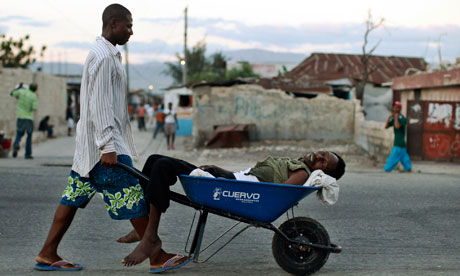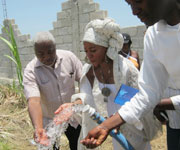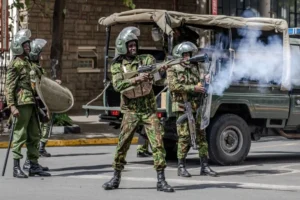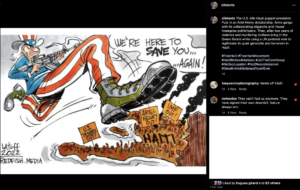by Ezili Dantò of HLLN
Summary: The UN plays the role of both arsonist and fireman in Haiti’s cholera epidemic. UN announces a rehashed 10-year plan for clean water that is unfunded. Kristof’s white savior bridge characters, filled with conflicts of interests, declare cautious success. They help throttle justice for Haitians, put bandages on plunder, help prolong Black and indigenous world suffering. UN plans for Haiti are not solutions. The UN is the problem.
(“Nicholas Kristof’s reason for perpetuating the Tarzan idiocy for his New York Times audience is self-indulgent, harmful, narcissistic and as racist as it’s lazy and cowardly. What’s the point of Kristof’s white saviors – his bridge character- helping the victims of rape, cholera or hunger in the Congo, Darfu or Haiti when it’s US taxpayer monies and US corporate welfare and the agricultural subsidies to US corporatocracy that supported their agent rapists, UN partisan presence or corrupt gov. clientele states to come to power or for them to maintain power and the rapes and disenfranchisement of the African masses? Mr. Kristof ought to teach that US citizens, of every culture, race or national origin, who care about Haiti, Africa should study US foreign policy. Then go try to change the duopoly in Washington before they impose themselves on Haiti or Africa through the NGOtocracy. Some bridges ought to be artifacts in old museums.”– See Ezili Dantò’s comment at NYTimes Columnist Nicholas D. Kristof Answers Questions, Nov. 28, 2012; Brandt Busted as Clintons with Hollywood celebrate sweatshop.)
UN Capitalizing on its imported cholera to privatize clean water in poverty-stricken Haiti
Judge Arterton, a US District Court judge that sentenced US charity worker Douglas Perlitz for molesting homeless Haiti boys nightly for the 10-years he was in Haiti running an orphanage to “help” put it this way: “If one digs a well to supply water to those who have never had water, and then that person poisons the water, was building that well a good deed?”
With Paul Farmer – who has an ineffective cholera vaccines program in Haiti wasting millions – designated as their “Special Advisor,” on December 11, 2012 at a press conference, the UNannounced a “new initiative to help eliminate cholera in Haiti and the Dominican Republic.”
Secretary Ban Ki Moon launched the UN’s grand (10-year water/sanitation) money laundering, no, its fundraising scheme to harm, oops no, to “aid” Haitians. As evidenced in the HLLN letter copied below, this water project is just a re-hashed initiative launched nearly a year ago. ( See, denied June 22, 2012 [ezilidanto] Request to peruse and comment on proposed 10-year plan by PAHO/UN to eradicate cholera in Haiti to be unveiled June 29 at OAS… erzilidanto, 06/22/2012 ; and [ezilidanto] 10-year international plan to PRIVATIZE clean water (funding NGOs) in Haiti unveiled June 29 in Washington, erzilidanto, 06/30/2012.)
The $2.2 billion initiative is unfunded. The $215 million from bilateral and multilateral donors the UN claims is available as newly added money are mostly previously pledged earthquake monies, monies pledged seven months before UN cholera ever hit Haiti but not given. See the Al Jazeera video interview on UN repackaging its fictitious, non-existent cholera aid to Haiti. Also, the UN refuses to set up a claims commission under the Status of Force Agreement with Haiti. It still doesn’t accept responsibility for its cholera epidemic, gives no verifiable legal assurances to the Haitian people that their raw sewage are not still being dumped in Haiti’s waterways.
But, capitalizing on its imported cholera plague to Haiti, deflecting liability and responsibility for the death of 8000 Haitians and sickness of 620,000 in two years, the UN appealed for help to raise $2.2 billion in more misery funds to fill their employee/ subcontractor pockets. It seems not to matter that no one’s been held accountable for the misused of the last $6 billions raised in the name of Haiti misery. The UN/US/PAHO/WHO and the NGOtocracy in Haiti continue to play arsonist and fireman.
Al Jazeera on UN repackaging fake cholera aid for HaitiEnjoy Yves Point Du Jour on Al Jazeera speaking what the white saviors always block, speaking the Haiti majority’s narrative! “Haitians are tired of the US occupation, we won’t play baseball” – Yves Point Du Jour *** Paul Farmer is not a cholera expert, Dr. Piarroux is a cholera expert and says epidemic in Haiti can be eliminated in months if there was the international will to do soCholera editorial-Haiti: Ezili Dantò on Wash Post Cholera editorialPaul Farmer, a total sell-outPaul Farmer and World Bank president Jim Yong Kim exposedPaul Farmer relieves himself on Haiti’s dying cholera victimsPaul Farmer is not a God but the face of the UN/USAID/World BankA messageto Paul Farmer, the Senate, Dobbins & Francois |
The new monies to be raised will go into the same hands, the same USAID/UN/NGO subcontractors with no public accountability to the Haitians, bolstering up an international system that has failed in Haiti for over 50-years. (US failed aid and false benevolence in Haiti;The Plantation called Haiti: Feudal Pillage Masking as Aid, and The White Savior Industrial Complex.)
The grand announcement is another theatrical press gambit and waste of monies on these drones’ travel, food and hotel expenses. It’s where the US/UN internationals act as if their meeting equates to “doing something” solid and urgent to address their filth — their imported disease, their (some say) biological and low intensity warfare. This multi-pronged attack is about using the image of the UN as the arbiter of human rights and justice, a claim that cannot actually be born out, but its their image. It’s about using this unearned credibility to raise more funds, not to “save the poor Haitians” but to tighten the stranglehold, elevate the “poor Haiti” narrative, have more future occasions to give themselves more titles, awards, jobs, more luxury hotel stays. (Listen to BAI interview Berstein with Kevin Pina on Haiti, Dec. 14, 2012)
UN Secretary-General Ban Ki-moon stated the “new initiative will invest in prevention, treatment, and education…The main focus is on the extension of clean drinking water and sanitation systems – but we are also determined to save lives now through the use of an oral cholera vaccine.”
Six month ago when the Pan American Health Organization/World Health Organization (PAHO/WHO) at the UN, not the Secretary-General, were unveiling this very same bogus 10-year UN plan to end UN cholera in Haiti, HLLN pointed out that world renowned cholera expert, ProfessorRenaudPiarroux maintains that the cholera epidemic in Haiti couldbegoneinmonths, that Paul Farmer’s cholera vaccines are ineffective and a waste of money. “If that is so,” we posted “this would castgreatsuspiciononthe NGOtocracy’s settlingin forthisopportunistic10-year, farfuture-2022-plan, asthe PAHO/UN Millennium Development-typeproposeddeclarationsandits signersseemtobemaintaining.” It’s brazen greed, outrageously dishonest and fraudulent.
The fake humanitarians create the problem, use the Shock Doctrine, Disaster Capitalism to occupy Haiti, disenfranchise the people, de-legitimized elections, then with the complicity of the mainstream media and white saviors both from the Left and Right duopoly, they put a black neocon Haiti suit (Laurent Lamothe) up front for publicity purposes to sell the world their 10-year “solution” to cholera as a legitimate Haiti-led initiative.
Then, when one-year later in December 2012, the UN “unveils” its repackaged request for more funds for itself and its subcontractors in Haiti and calls this “eradicating cholera,” this travesty is capped off for public consumption by having the fraudulent progressives and justice-seekers (the weapons of mass distraction) speaking on behalf of Haitians, declaring “SUCCESS.” Basically preparing to collect more funds, inducing more revenue into their coffers, writing articles, showing this UN warmed over six-months rehashed unveiling of a 10-year plan was a result of their advocacy, letters and petitions that were a SUCCESS!
See, for instance, Mark Weisbrot’s Op-Ed: More Pressure Necessary to Get Desperately Needed Clean Water to Haiti which trumpets the suspect UN cholera plan as at least “a beginning,” a showing of the capacity of the UN to what? judge itself fairly, provide what? money to private NGOs with no public accountability to Haitians?
Oh, this cholera eradication plan from the cholera importers in Haiti is “incremental justice to Haiti,” seriously opine the Leftist intellectuals from the West. No joke.
The aim, of course, of most foreign aid to Black countries is to keep them in perpetual poverty, ill health, chaos by design, dependency, and so disenfranchised and desperate they are compelled to do Western biddings. (Haiti’s Gold Rush – an Ecological Crime in the Making; The Plantation called Haiti: Feudal Pillage Masking as Aid.)
 A Haitian with symptoms of cholera is transported in a wheelbarrow in the slums of Cite-Soleil in
A Haitian with symptoms of cholera is transported in a wheelbarrow in the slums of Cite-Soleil in
Port-au-Prince the month after the outbreak began in 2010. Photograph: Eduardo Munoz/Reuters
Source: The Guardian, UN seeks $2bn for cholera epidemic ‘introduced by UN peacekeepers’, Nov, 29, 2012; Haiti’s case against the UN for importing cholera epidemic, Oct 2010
The Haitian Lawyers Leadership Network (HLLN) repeatedly points out the false benevolence, the basic Haiti rights repealed, the harm, the glorification ofdisenfranchisement and sweatshops, the conflicts with the white industrial paternalistic, condescending “bridge character” folks in Haiti vis-a-vis Haitian best interests, justice and sovereignty.
No Caucasian typifies the white savior tool of imperialistic Black oppression and trajectory more than Paul Farmer and his cohorts.
Paul Farmer runs Partners in Health which distributes the UN supported oral cholera vaccines. His partner, Jim Yom Kim, now runs the World Bank. Farmer is the UN Special Deputy Envoy to Haiti, a long time board member of Brian Concannon’s Institute of Justice and Democracy in Haiti (IJDH) and now he’s also the special appointed advisor for the UN’s 10-year cholera eradication plan that dodges liability for UN bringing in cholera to Haiti, that denies justice to Haiti victims.
Yet, Brian Concannon’s IJDH with Paul Farmer on its board and obvious conflicting interests, claims to legally be representing the Haiti cholera victims, sending a demand last November 2011 that’s oftentimes, for fundraising purposes, billed as a law suit asking the UN to judge itself guilty and apologize to the victims!
This is an inside job. It’s definitely the fox guarding the chicken coop. These “bridge” characters crowd out most Haiti-led relief, use exploited Haiti fronts to legitimize their fundraising junkets, build bridges for white supremacy and cultural hegemony death crossings while watching each others backs from their various spheres and beltway platforms.
Commenting on the UN’s “new” water project for eradicating cholera in Haiti, here’s the Mark Weisbrot destructive distraction and spin:
“While we are still a long way from implementation, there are important lessons to be learned from this experience. Perhaps most importantly, it shows that organized political pressure can work.. the Institute for Justice and Democracy in Haiti went to the U.N. to file for damages and reparations. Many other groups and individuals kept the issue in the news and wouldn”t let it go away… Newspaper editorial boards such as those of the New York Times and the Boston Globe called on the U.N. to take responsibility for the disaster that it caused. As a result of grassroots organizing, the majority of Democrats in the U.S House of Representatives signed a letter to the same effect...Bill Clinton, U.N. Special Envoy to Haiti, admitted that the U.N military mission was responsible for the deadly outbreak, but the organization maintains its denial. Tuesday’s announcement by the governments of Haiti and the Dominican Republic, together with the U.N., of a 10-year plan to eradicate cholera from the island shared by the two nations is a step forward, and a result of all the pressure that has been brought to bear over the past two years. Better late than never, but it is still just the beginning…” — Mark Weisbrot, More Pressure Necessary to Get Desperately Needed Clean Water to Haiti
The rescuers have mostly been hard at work re-imaging the Haiti occupation, giving a civil face to the Duvalierists, opening Haiti up for business in the time of cholera, fragmenting Haiti’s voices, denying the horrible evil and international crime scene that Haiti is. Denying the masses’ struggle for fair elections since 2004, obfuscating the main issue which is that Haiti is illegally, unjustly occupied by the US and Paul Farmer’s NGOtocracy ; that Western aid is MEANT and STRUCTURED to fail; that the Haiti majority must take back their sovereignty, Haiti’s mineral and oil wealth must stop being denied and pillaged. The US corporatocracy and Ngotocracracy occupation behind UN proxy guns MUST end. Vicious US imperialism in Haiti, its outright aggressions and uses of the UN peacekeepers to cover this up, its uses of Americans like Bill Clinton at the UN and the Paul Farmer NGOtocracy as its tool of mayhem, of oppressive Haiti decision-making and rule cannot be discounted, ignored or denied.
The U.S. Permanent Representative to the United Nations, Ambassador Susan E. Rice, has put the whole matter in context thus:
“The truth is: the UN Security Council can”t even issue a press release without America’s blessing. The UN depends entirely on its member states, not the other way around. When the UN stumbles, it’s usually because its members stumble”because big powers duck tough issues in the Security Council or spoilers grandstand in the General Assembly. As one of my predecessors, the late Richard Holbrooke, was fond of saying, ‘Blaming the UN when things go wrong is like blaming Madison Square Garden when the Knicks play badly.'”
The US is the respondeat superior for the UN crimes in Haiti. The US is calling the shots at the UN on Haiti (along, to a lesser extent, with France and Canada) as the original Haiti regime change initiators. Together, these member states at the UN are jointly and severally liable for the UN harm done to Haiti since February 29, 2004, including legally responsible and sharing liability for the UN bringing in cholera, for slaughtering innocent Haitians in the populous neighborhoods en mass, for the raging impunity of their re-imaged death-squads and neoDuvalierists civilian fronts and for the rotten child molesting and other crimes perpetrated against defenseless Haiti civilians. There can be no Haiti justice outside of this Haiti context and narrative. Period, no comma.
Denis Bernstein on Flashpoints interviews Kevin Pina on UN’s 10-yr talk to end cholera. Speaks on the UN/Clinton/ NGOtocracy re-branding of Haiti with Hollywood celebrities fronting non-profits, endorsing sweatshop as “building back better”, mere Madison Avenue logo repackaging. Nothing substantially for the cholera victim. It’s the use of Haiti imported misery to fund raise -same old thugs supported by the Internationals, same old “aid” business as usual. |
***
The UN, its Haiti policy-making member states and its other neocolonial partnersare attempting to collect $2.2 billion more misery funds on imported foreign misery to Haiti while planning to further privatize clean water to dodge public accountability. Yet, this blatant money laundering scheme is seen by the UN apologists as “some” justice, an authentic good for Haiti and the cholera victims? ([ezilidanto] USAID/Chemonics/UN/PAHO/NGOtocracy in Haiti continues to play arsonist and firemen; The U.N. has requested $2.2 billion to battle a cholera epidemic in Haiti that has killed nearly 8,000 people since 2010.; and Unease over UN bid to eradicate Haiti cholera and Audit: USAID Haiti work ‘not on track’).
The whole colonial disaster capitalism model is so disturbingly, boringly predictable and horrid.
Below is the HLLN letter to UN/PAHO back six months ago when the UN had their first or was it their second such public “unveiling” on how to end cholera in Haiti? The UN keeps talking to raise funds for their peacekeeping presence in Haiti, keep cunningly and repeatedly “unveiling” their privatization plans for Haiti water and no justice for Haiti. (Back in March 2010, Bill and Hillary Clinton held a similar champagne pledging party at the UN where numbers in the billions wereblithely cast about for a first 10-year relief and reconstruction plan to “rebuilt Haiti back better.” This was after the earthquake and seven months before cholera hit Haiti in October 2010. The same funds pledged then that went uncollected are part of the $215million being re-pledged for the UN’s newest 10-year initiative in Haiti. This is US-Euro pillage in Haiti, masking as humanitarian aid.)
The mainstream media and humanitarian progressives willingly swallow the manipulative lies, ignore that foreign aid is about creating jobs for foreigners and selling foreign products and services abroad. Life worsens for Haitians in Haiti when the world’s public are made to foolishly believe these spinning of wheels and high-tech money laundering schemes are about “helping Haitians.” Justice deferred is justice denied.
Just days after the October 2010 UN cholera deaths began, Ezili’s HLLN pointed out, in an interview with broadcaster Yves Point Dujour, that “the accused UN cannot investigate itself…the genocide going on in Haiti is obvious … we’re looking at the evil but we don’t want to compute it.”
It’s not surprising to Haitians that the UN continues to deny liability for their gross and criminal negligence, for bringing death to Haiti.
We know about the Ottawa Initiative. We live the fear of the immigration deportations and unequal immigration policies. We deal each and every nightmarish day of this US hidden occupation with why there is a UN, Chapter 7 peace-enforcement mission in Haiti for 9 years. A country not at war, without a peace agreement to enforce and with less violence than most countries in the Western Hemisphere. Their imported disease provides the opportunity to accidentally kill 8000 Haitians, infect over 620,000, raise and launder more taxpayer and donor country monies, sell more Paul Farmer pharmaceuticals, write more Nicholas Kristof/TracyKidder white savior partisan pieces, experiment on the sick as guinea pigs with never-before-used-in-an-epidemic cholera vaccines, stay in Haiti for their 10-year plan to capitalize on cholera: playing arsonists and firemen.
As long as troubled bridges conveniently integrate with – flow or crumble into – the waters of injustice, the world will not change.
Ezili Dantò of HLLN
December 14, 2012
(revised)
*****
Washington Justice For Haiti:
In support of Paul Farmer’s pharmaceuticals and the Farmer groups – Brian Concannon/IDJH – asking the UN to judge itself guilty on behalf of Haiti cholera victims, Washington Post opines, justice for the Haiti cholera victims would be collectively awarding $40million to Paul Farmer pharmaceuticals for cholera vaccines
( Haiti: Ezili Dantò on Wash Post Cholera editorial.)
Avatar Haiti in full force with foreigners
The White Savior Industrial Complex
Civil Alert interview (177:03min): Ezili Dantò of the Haitian Lawyers Leadership Network (HLLN) speak about the Haitian Revolution and its hidden history, January 3, 2013, Civil Alert/BlogTalkRadio. |
“Nicholas Kristof, columnist for the New York Times says the white savior is a “bridge” character. A bridge to where? White supremacy and cultural hegemony? Some bridges ought to burn down.
Neither Haitians nor Africans want your pity, your World Bank, NGO or IMF false charity. Just give us a fair price for our natural resources. Tell the white saviors to go to Washington or London or Paris, tell their own and the US/Euros and UN Security Council tyrants to stop blocking democratic elections and governance, allow the one-person-one-vote to count so that Haitians. Africans, Palestanians and the masses everywhere may push common good interests, live in dignity to provide for their own sons, daughters, for their own country’s public infrastructure needs.
Nicholas Kristof and the NYT ought to bring attention to US oppression and aggression in Africa that caused the humanitarian needs in the first place. But he continues the “Caucasians-are-the-center-of-the-planet” colonial narrative – puts a bandage on plunder, helps prolongs Black and indigenous world suffering. Kristof’s reason for perpetuating the Tarzan idiocy for his New York Times audience is self-indulgent and as racist as it’s lazy and cowardly.” –Ezili Danto, Nov. 28, 2012
—–Original HLLN Message to UN/Paho/WHO on 10year plan—–
From:zilidanto<erzilidanto@yahoo.com>
To: Dicksonc@paho.org
Sent:Fri,Jun22,20121:39am
Subject:Requesttoperuseandcommentonproposed10yearplanbyPAHO/UNto
eradicatecholerainHaititobeunveiledJune29atOAS
EziliHLLNForwardedMail
*************************
Ms.CatherineDickson
Advisor,ProgramandPolicy
OfficeoftheDeputyDirector
Dicksonc@paho.org
DearMs.Dickson
Re:10yearplanbyPAHO/UNtoeradicatecholerainHaititobeunveiledJune
29atOASofficeinWashingtonDC.
ThisisEziliDantòfromHLLN.Wouldyoukindlyforwardtoouremailat-
erzilidanto@yahoo.com-acopyoftheproposedPAHO/UNdeclarationaswellas
adraftofthe10-yearplantoeradicatecholeraontheIslandofHaiti.
It’sourunderstandingthattherewillbe”aJune29thmeetinginWashington
to unveila10-yearplanbasedonhealthawarenessandwaterpurificationto
completelyeradicatethecholeraepidemicontheIslandoccupiedbyHaitiand
DominicanRepublic.Thisplanweare advisedistobeunveiledbyPAHOandOAS
attheOASbuildinginWashingtonDC,onJune29th,2012,from12p.m.to2:30
p.m.”
AsaHaiti-led,Haiti-capacitybuildingcommunityandinternational organizationwhichhasbeenactivelyinvolvedininformingourover3million
constituentsandcountlessHaiticommunity-leadersandgrassroots organizations aboutUNcholeraimportationtoHaitifromOctober2010tothe present,weare mostinterestedinanyplansoftheUNthatwouldadmit liabilityfrom negligentlybringingcholeratoHaitiandarrangeabinding settlementfor cleaningupitsenvironmentaltoxinsfromHaitiwaterways.Wedohope that this iswhatyourPAHO,June29thmeetingisabout,andnotapretextfor theusual NGOtocracy’sdisastercapitalizingonforeign importedmiserytoprovidemore workandincomeforthemselvesovera10-yearspanwithnooversightor accountabilitytoHaitipeopleorthevariousHaitivictims.
CertainlyEzili’sHLLNhasavestedinterestsinperusingthisplanand participatinginitsconstruction.YoumustknowthatweindigenousHaitians at Ezili’sHLLNfeelexcludedfromalldecision-makingprocessesthatthe UN/PAHO/WHOhassofarundertakentoalleviatethedeadlyconsequencesofthe
UNMINUSTAHtroopsbringingtheworstcholeraepidemiconplanetearthto
Haiti.Justice,equity,andamoralcompasswouldinstructadifferentUNand
necessarilyWHO/PAHOmannerofdealingwithHaitivictimsofcholera,boththe
physicalandpsychologicalconsequencesitswroughtonourdefenselessnation
andpeoples.
Itisourunderstanding,Ms.Dickson,thatthe”goalofthismeetingisto gathersupportfromHaitikey-partnersandcommunity-leadersaroundthe decision-makerssuchastheMinistersofHealthfrombothHaitiandDominican
Republic,theDINEPAandallauthoritiesinvolvedinthebattleagainstthe
choleraepidemic.”
Fromwhatwe’veread,supposedlyinvitationstothisPAHO/UN/OASsponsored
meetingislimitedtoaselectedfew,agroupoflessthan75.
We’dliketorequest,ataminimumthattheHaitianLawyersLeadershipNetwork
(HLLN),whichrepresentsHaitihumanrightsingeneralandthousandsofthe
choleravictimsinparticular,begivenaccesstothisPAHO/UNplan,its
method ofaccountabilityandindependentnon-UNoversightparameterssowemay
properlyperusethisproposalandshare itwithourpublicEziliNetwork.
Simplejusticeandmoralconsciencedictatessuchgrassroots,Haiti-led
participationintheconstructionoftheUNplantobegintorectifyits
wrong.
Ezili’sHLLNlooksforwardtoreceivingyourinformationonhowUN/PAHOplans
toremovetheUN-toxinandprovidesustainable(human,economic,
environmental) waterandsanitationinfrastructureforHaitisufferers.
Bestregards,
EziliDantò
President,HaitianLawyersLeadershipNetwork
June22,2012
*
UN launches new initiative to eliminate cholera in Haiti and Dominican Republic, Dec. 11, 2012
Regional Coalition for the elimination of cholera in Haiti and the Dominican Republic, June 29, 2012 and International Partners Back Investment in Water and Sanitation to Eliminate Cholera From the Island of Hispaniola
****************************
More Background Information
****************************
ExposetheLiesthatfragmentHaitioppositiontothetyrants,colonialterror
andtheNGOtocracy-FreeHaiti
***
“Stop the media lies and UN spin that the protests in Haiti are “political.” That’s just the UN representatives being their normal partisan and bias selves in Haiti. Nothing new there. The facts support the Haitian accusations that the cholera is imported and not from Haiti. The CDC has confirmed this. There is no doubt that UN Nepalese fecal matter has been improperly disposed and dumped into Haiti’s rivers and waterways. Would you, as parents, not be up in arms if it were your babies, your children, your mother, son, daughter, aunt, friends, family – your loved ones – who where dying from a foreigners’ gross criminal negligence? The UN’s attempts at dehumanizing the Haiti protestors who are parents, mothers, fathers, grieving friends, and dismissing their concerns clearly evidences that they are not a true “peacekeeping” force. Besides which, the island people of Haiti have been asking for an end to the UN occupation for quite some time, and have a long memory of US/Euro abuses at the hands of the “more civilized.” Haitians are the Tainos, the Comanches, the Cherokees and Cholera is small pox in a blanket. The accused UN cannot investigate itself. (See, Haiti’s case against the UN for importing cholera epidemic ).
The only ones interested in the upcoming Nov. 28 elections are not the Haitian people who have been disenfranchised since Bush Regime change 2004, but the US corporate interests bent on consolidating their anti-democratic power and getting Rwanda genocide death numbers in Haiti. Spread the truth about the corporatocracy’s arrogance, ethnic cleansing and privatizations in Haiti led by Obama’s appointed Clinton/Bush Fund and over 16,000 NGOs. Ask President Obama and the US Congress to withdraw from Haiti, stop blocking investment in the PEOPLE, water treatment plants, sewage treatment plants, roads, public sector jobs, health care, education, self-determination and sovereignty.” (See, Avatar Haiti: November 18, 2010 Vertieres Rememberances — What Can YOU Do to Stop the neo-feudalism in Haiti? – http://bit.ly/bGLivk )” — Excepted from a November 21, 2010 Ezili Danto post entitled “Haitians dehumanized as violent “insurgents” : Pedophile Perlitz takes advantage of the dehumanization, tries to postpone his sentencing.”
Poverty Pimps masturbating on Black pain: Monsanto joins the pack
More Pressure Necessary to Get Desperately Needed Clean Water to Haiti |
| Mark Weisbrot, CEPR Al Jazeera English, December 12, 2012 See article on original websiteMore than two years and nearly 7,800 deaths after U.N. troops brought the dread disease of cholera to Haiti, a plan has finally been put forward to do something to get rid of it. |
While we are still a long way from implementation, there are important lessons to be learned from this experience.
Perhaps most importantly, it shows that organized political pressure can work.
There have been protests from many thousands of Haitians, and the Institute for Justice and Democracy in Haiti went to the U.N. to file for damages and reparations.
Many other groups and individuals kept the issue in the news and wouldn”t let it go away, as much as the U.N. and powerful governments wanted it to disappear.Newspaper editorial boards such as those of the New York Times and the Boston Globe called on the U.N. to take responsibility for the disaster that it caused.As a result of grassroots organizing, the majority of Democrats in the U.S House of Representatives signed a letter to the same effect. Still, the U.N. has continued to deny its responsibility despite conclusive scientific and forensic evidencethat its troops had brought the disease from South Asia, and transmitted it by dumping human waste into a tributary of Haiti’s main water supply.This was gross negligence of the highest order. Haiti is especially vulnerable to this type of a water-borne disease because of its lack of clean water and sanitation. Troops coming from areas where cholera was present should have been adequately screened and tested, and of course there is no excuse for their reckless disregard in polluting the Artibonite river with the deadly bacteria. In March of this year, Bill Clinton, U.N. Special Envoy to Haiti, admitted that the U.N military mission was responsible for the deadly outbreak, but the organization maintains its denial.Tuesday’s announcement by the governments of Haiti and the Dominican Republic, together with the U.N., of a 10-year plan to eradicate cholera from the island shared by the two nations is a step forward, and a result of all the pressure that has been brought to bear over the past two years. Better late than never, but it is still just the beginning.
In the first place the plan is much too slow.
This is an ongoing national health emergency: About 700 people have been killed by cholera just since the first rains began in April, 167 of them since Hurricane Sandy caused widespread flooding. But this is a 10-year plan. We are still looking at several years before serious work begins to provide Haiti with the clean drinking water and sanitation needed to get rid of cholera. According to the most recent data from the World Bank, only 69 percent to “improved drinking water” and just 17 percent have access to “improved sanitation,” defined in the plan as “flush toilets, septic tanks, ventilated improved pit latrines, and composting toilets.”Among the poorest 20 percent, only 1 percent has access to improved water and more than 90 percent “practice open air defecation.” The necessary infrastructure work should begin immediately, not years from now.Haiti is a very small country, smaller than the state of Maryland, with 10 million people. There is no civil war or violence that would prevent or delay the construction of water and sanitation facilities. The two-year delay in even announcing a plan has been tremendously costly in human lives; this plan needs to be implemented immediately and much faster than it appears to be scheduled for.Meanwhile, even the funds for treatment of people with cholera are lacking. One of the most important non-governmental organizations in Haiti, Partners in Health, says that its U.S. funding for cholera treatment runs outin February.In 2012 the U.N. requested just $30 million for cholera treatment, yet only 34 percent of this has been raised. There were 205 cholera treatment units and 61 cholera treatment centers last August; by June, these had fallen to 38 and 17, respectively.And that is perhaps the biggest problem: for all the talk of “building back better” after the earthquake nearly three years ago, very little has been delivered. Of $5.3 billion pledged by governments to help Haiti, just $2.8 billion (53 percent) has been disbursed. (For the U.S., it is $250 million of $900 million pledged, or just 28 percent.)So now we have the U.N. once again putting its hand out for money, for a 10-year plan to deal with a national emergency that has not even been nearly adequately dealt with over the last two years, with treatment facilities two years in a row closed just before the rainy season caused a spikein cholera infections. It is not a promising track record; rather a track record of broken promises.With that in mind, thousands of people around the world have already signed a petition” initiated late last week by film director Oliver Stone – to keep up the pressure to accelerate this project and make sure that it actually happens.It’s the least that the international community can do, after all of the suffering it has inflicted on Haiti in recent yearsas well as centuries: just clean up some of their own mess.
Mark Weisbrot is co-director of the Center for Economic and Policy Research, in Washington, D.C. He is also president of Just Foreign Policy.

At a camp for displaced persons in Port au Prince, Haiti, residents get bleach and water purification tablets which are used in cholera prevention. Photo: UN/MINUSTAH/Logan Abassi
Source: UN News Center
11 December 2012 – The United Nations today announced a new initiative to help eliminate cholera in Haiti and the Dominican Republic, the two nations that make up the Caribbean island of Hispaniola.
“The new initiative will invest in prevention, treatment, and education – it will take a holistic approach to tackling the cholera challenge,” said Secretary-General Ban Ki-moon at the initiative’s launch. “The main focus is on the extension of clean drinking water and sanitation systems – but we are also determined to save lives now through the use of an oral cholera vaccine.”
“Because global vaccines are in short supply, we will first target high-risk areas: densely populated urban areas and rural areas far removed from health services,” he added. “As production increases, the vaccine effort will expand its reach.”
Launched at UN Headquarters in New York in the presence of government officials from the two countries, the new initiative will support an existing campaign – known as the Initiative for the Elimination of Cholera in the Island of Hispaniola – established almost a year ago by the Presidents of Haiti and the Dominican Republic.
Cholera is an acute intestinal infection caused by eating food or drinking water contaminated with the bacterium known as vibrio cholerae. The disease has a short incubation period and produces a toxin that causes continuous watery diarrhoea, a condition that can quickly lead to severe dehydration and death if treatment is not administered promptly.
In his remarks at the launch, the Secretary-General noted that in Haiti the disease has claimed the lives of more than 7,750 people, infected over 620,000, and added more suffering to a country already recovering from a major earthquake in 2010, the largest natural disaster in the history of the western hemisphere.
Ten months after the earthquake, the Caribbean nation experienced a major cholera outbreak.
The United Nations and its partners have been working with the Haitian authorities to respond to the outbreak, with a focus on water and sanitation facilities, as well as on training, logistics and early warning.
“Haiti has seen a dramatic fall in infection and fatality rates. But this will not be a short-term crisis,” Mr. Ban said. “Eliminating cholera from Haiti will continue to require the full cooperation and support of the international community.”
The UN chief said resources will be critical, with Haiti needing almost $500 million over the next two years to carry out its national implementation plan for the disease.
Noting that the relevant humanitarian appeals are less than half-funded, Mr. Ban said he will “use every opportunity” in the months ahead to mobilize more funding.
“Today I am pleased to announce that $215 million in existing funds from bilateral and multilateral donors will be used to support the initiative. I thank the donor community for this generous commitment,” Mr. Ban said. “The United Nations will do its part. We are committing $23.5 million, building on the $118 million the UN system has spent on the cholera response to date.”
He added that the United Nations will also continue to support the Government of Haiti in tracking cholera spending and ensure the effective use of resources.
“Today, as ever, we are in Haiti for one reason alone: to help the Haitian people make their great country all that it can be. We know the elimination of cholera is possible. Science tells us it can be done. It has happened in difficult environments around the world. It can and will happen in Haiti,” the Secretary-General added.
At the launch, the Secretary-General also announced that a world-renowned humanitarian, Dr. Paul Farmer, will serve as his Special Adviser focusing on community-based medicine and on drawing lessons from Haiti that can be applied to other places in need.
******
Haiti: UN urges investing in water and sanitation services to combat cholera
******
Haiti seeks $2bn for cholera epidemic ‘introduced by UN peacekeepers’
Nepalese troops thought to be source of disease that has killed 7,500 – more than violence that brought peacekeepers to Haiti
by Jonathan Watts, The Guardian, Nov, 29, 2012
Haiti is to call on the international community for more than $2bn (£1.25bn) to fight cholera amid growing evidence that UN peacekeepers started the world’s worst epidemic.
The government’s 10-year plan to improve sanitation and water provision will be unveiled with the backing of foreign aid groups and the UN, which is accused of one of the greatest failures in the history of international intervention.
It follows reports of a recent spike in cholera cases following hurricane Sandy and warnings from non-governmental organisation (NGOs) that the US and other big donors are cutting back on funding for disease control.
A growing body of medical research identifies Nepalese peacekeepers as the source of the pathogen, which had been unheard of in Haiti for a century until the death in October 2010 of a villager who lived downstream of the UN camp in Mirebalais.
Since then, cholera has spread along the river and into the slums of the capital, Port-au-Prince. About 6% of the population have been infected and more than 7,500 people have died – a higher toll than the political violence that brought the peacekeepers to Haiti. According to the World Health Organisation, the 340,000 cases in Haiti last year were more than the rest of the world put together. This year, the number of cases has declined, but hundreds of infections are still being diagnosed every week, particularly after hurricane Sandy.
Last week the International Organisation for Migration said Haitian officials had reported a spike of 3,593 cholera cases since the middle of October. The organisation’s spokesman, Jumbe Omari Jumbe, told reporters in Geneva: “The numbers are going up particularly in [refugee] camps around the capital, Port-au-Prince.”
The government will ask for more than $500m for the next two years in a short-term emergency response to the epidemic. Another $1.5bn will be requested for the following eight years to eliminate the disease. While this plan will call on funds from private donors, companies, NGOs and international bodies, many victims and activists believe the UN must take a greater responsibility because its personnel are likely to have brought the cholera to Haiti.
The UN has not accepted culpability. It launched an investigation into its role, but a panel of experts concluded in 2011 that the outbreak was not the fault of “any group or individual”.
Although it acknowledged inadequate sanitation at the Mirebalais barracks as a possible source of the bacterium, it said this was not completely certain and that other factors – including poor public sewage systems and water treatment – contributed to the outbreak.
However, a former panel member – a US cholera specialist, Daniele Lantagne, ”recently cited new data that suggests the Nepalese troops were most likely to have been the source. Based on full genome sequencing, she concluded: “We now know that the strain of cholera in Haiti is an exact match for the strain of cholera in Nepal.”
This backs up long-held suspicions of locals in Mirebalais. Although the Nepalese troops have been replaced by Uruguayans and the sewage canal from the camp has been cleaned up, residents have not forgotten or forgiven what the UN peacekeepers did to their area.
“The troops were shitting and pissing in the river. It used to stink. Many people got sick,” said Johnson Pierre as his girlfriend washed clothes in the stream. “We don’t like the UN. They have given us nothing. They’re not clean. And we are still getting cholera.”
In Meye village, which sits across the road from the barracks, a sign above the first house reads: “Have Mercy Nepalese.”
Everyone in the community has either had cholera or knows a relative or neighbours who have been infected.
“There were people dying in hospital and I thought I was going to join them,” says Audeline Louis-Jeune, a 23-year-old villager who was one of the first to suffer in 2010. She is unsure how she was infected, but like all the local residents she has never stopped using the river to wash clothes.
At the hospital in Mirebalais, medical staff recall the first cholera patient they saw on 17 October 2010 – a woman from Pageste village. Since then, they have accepted thousands of cases despite educational campaigns to encourage locals to be careful about possible sources of infection. “It’s very difficult in Haiti to get treated water. Many people have no choice but to use the river for washing, despite the risk of contamination,” said Thelisma Heber, a doctor with the Partners in Health NGO.
Asked if the outbreak was linked to the UN base, Heber was cautious. “I don’t have the information to prove that the Nepalese troops are the origin. All I know is that before 2010, there was no cholera.” Last year, a coalition of lawyers and campaigners lodged a multibillion-dollar claim at the UN headquarters for 5,000 plaintiffs. It demands $100,000 compensation for each of the families of the victims and calls on the UN invest at least $750m in the water infrastructure of Haiti, which ranks last on global water poverty indexes despite its many rivers, lakes and streams.
In its 67-year history, the world body has never set up a committee to assess large-scale claims for compensation, although its rules permit it to do so. But momentum is building behind the Haiti case.
“There is general agreement that this wall of impunity is going to come down at one time or another,” said Brian Concannon, director of the Institute for Justice & Democracy in Haiti. “If any case should do it, this would be it as the case is so clear. We are on right side of the tide of history.”
His group plans to expand the lawsuit to include thousands more cases. If the UN fails to respond, he says lawyers are preparing to file the case in a national court in the US, Haiti or Europe.
Pressure for action is also coming from grassroots organisation. Haitian senators are also drafting a resolution calling for reparations that will be submitted next month, according to Camille Chalmers, of the Haitian Platform to Advocate Alternative Development.
“If the UN doesn’t take responsibility, there’ll be protests,” he says.
The UN’s head of humanitarian affairs in Haiti, Nigel Fisher, said the matter was under consideration by the organisation’s lawyers. “Obviously we are aware of the latest reports and analysis. Unfortunately, we have to leave this in the hands of the legal process until they have worked that through,” he said. “I hope that is sooner rather than later. We’d all like to put that issue behind us so we can contain the continued epidemic.”
Though cholera deaths have fallen from 7,000 until the end of 2011 to 600 this year, they continue to tarnish the UN’s reputation and add to doubts about whether the $600m of foreign aid being poured into Haiti each year is helping or hurting the country.
Cholera is not just a disease of the poor – it is a disease that worsens poverty. Villagers must now buy bottled water to drink and cook. They need chlorine to purify water before they bathe. Poor governance and the dire conditions in much of Port-au-Prince add to the problems.
Driving past street vendors selling meat and vegetables off a floor littered with rubbish and puddled with murky water, Mathieu Fortoul of Médecins sans Frontières explained the risks.
“You can see why it has spread,” he said. “People know the risks, but they lack the means to protect themselves. The problem here is that people don’t have access to soap and drinkable water.”
The death toll would be much higher if it were not for the tented control centres that have sprung up around the country. The facilities are basic, but effective: beds, drips, disinfectant and careful segregation of confirmed and suspected cases.
At the Carrefour centre, five-year-old Yvena Marcellus was brought with the typical symptoms of diarrhoea and vomiting. She still has stomach ache but is likely to make a full recovery. “We don’t know how she got infected. She was just playing on the ground,” said her aunt, Mikerlande Eugene.
The Haitian government has practically renounced any responsibility for cholera treatment in the capital. Even before a recent doctors’ strike, hospitals were turning away patients or referring them to foreign NGOs.
“If we are over -apacity, it is because of the health ministry. They refer all cases to NGOs, but with the fall in international funding, there is a struggle,” said Fortoul. “In May we treated 70% of the cholera cases in Port-au-Prince. At the peak, that was 500 cases in a week. Two years after the start of an epidemic, that’s not normal. The ministry of health should take responsibility. We shouldn’t be a substitute.”
NGOs are finding it harder to get donations.
Louise Ivers, an adviser at Partners In Health, said the US government’s funding for their Haiti cholera programme would run out in February. “But the emergency isn’t over. Cholera is still a leading cause of death in Haiti and we continue to see cases spike with rain,” she said.
While a new drive for funding is prepared and legal wrangles continue, the disease continues to take a toll – and there is little optimism that it will be eradicated in the near future. “Haiti had never seen a case of cholera before October 2010, yet somehow needless cholera deaths are beginning to be accepted as the new norm. That is an outrage we cannot accept,” Ivers said.
****
Kevin Pina on UN cholera eradication plan, December 14, 2012
**************
International Partners Back Investment in Water and Sanitation to Eliminate Cholera From the Island of Hispaniola
 Salvador, Bahia, 7 June 2012 (PAHO/WHO) – Representatives of several international organizations pledged this week to promote investments in water and sanitation infrastructure as key steps toward the elimination of cholera from Haiti and the Dominican Republic. The pledges were made during the launch of a new Regional Coalition on Water and Sanitation for the Elimination of Cholera in the Island of Hispaniola, on June 4 in Salvador, Bahia, Brazil.
Salvador, Bahia, 7 June 2012 (PAHO/WHO) – Representatives of several international organizations pledged this week to promote investments in water and sanitation infrastructure as key steps toward the elimination of cholera from Haiti and the Dominican Republic. The pledges were made during the launch of a new Regional Coalition on Water and Sanitation for the Elimination of Cholera in the Island of Hispaniola, on June 4 in Salvador, Bahia, Brazil.
The members of the new coalition are the Pan American Health Organization/World Health Organization (PAHO/WHO), UNICEF, the Centers for Disease Control and Prevention (CDC), the Spanish Agency for International Development Cooperation (AECID) and the Inter-American Association of Sanitary and Environmental Engineering (AIDIS). They pledged to support efforts by the governments of Haiti and the Dominican Republic to harmonize and streamline international assistance and investments in water and sanitation infrastructure aimed at eliminating cholera from the island. They also issued a declaration urging other governments and international organizations to support these efforts.
“By becoming signatories to this coalition and the accompanying declaration, we move one step closer to achieving our vision of a cholera-free Hispaniola and a cholera-free Americas,” said PAHO Director Dr. Mirta Roses Periago in presenting the declaration at the 33rd Congress of AIDIS.
On January 11 of this year, the presidents of Haiti and the Dominican Republic, together with representatives of PAHO/WHO, UNICEF, and the CDC, issued a call to action to eliminate cholera from both countries through new investments in water and sanitation infrastructure. The new Regional Coalition on Water and Sanitation for the Elimination of Cholera in the Island of Hispaniola will bring together the necessary technical expertise, raise new funds, and mobilize previously committed pledges.
More than half a million people are estimated to have been sickened by cholera in Haiti between October 2010 and May of this year, and more than 7,000 have lost their lives. The Dominican Republic has reported more than 21,000 cases and over 400 deaths from cholera.
“The situation is unacceptable and requires our joint attention. Only major improvements in Haiti’s water and sanitation systems will provide durable solutions to the epidemic over time,” said Dr. Roses. “Communities where everyone has clean water to drink and a safe place to go to the toilet are within our grasp. Lives can be saved, productivity increased, security heightened, and health costs reduced.”
Even before the January 2010 earthquake, only 69% of Haiti’s residents had access to safe drinking water, and access to sanitation had declined from 26% of the population in 1990 to only 17% in 2010. In the Dominican Republic, 86% of the population had access to improved drinking water sources and 83% had access to improved sanitation in 2010.
The coalition pledged to support efforts to achieve “water and sanitation for all” on the island by promoting cross-sector and multi-institutional dialog and action at the local, national, and international levels, as spelled out in national and bilateral plans for the elimination of cholera on the island of Hispaniola.
The plans include efforts to guarantee chlorinated water and surveillance of quality for all water sources, and include support for the responsible institutions at the national and provincial levels to improve or construct new sewage systems and provide training in their correct use and in personal hygiene.
In her remarks, Dr. Roses recalled the cholera epidemic in the 1990s that spread to over 20 countries in Latin America, with the last case reported in 2002. She said investments in water and sanitation infrastructure and health promotion helped stem the epidemic and contributed to the virtual elimination of cholera from Central and South America within eight years.
“If left unchecked, these deadly but preventable diseases threaten to spread once again to the rest of the American hemisphere, with their high toll on human life and well-being and producing an economic catastrophe as a result of impacts on agricultural trade, tourism, and a hesitancy to invest by private sector industries,” warned Dr. Roses. “Every case and death from cholera is preventable. Every new case highlights the unacceptable social and economic inequities reflected in poor living conditions and limited access to clean water and sanitation services.”
Dr. Roses pointed out that there is a historical precedent for the Regional Coalition. Beginning in the 1960s, PAHO/WHO managed a “Community Water Supply Fund” based on voluntary contributions from countries. PAHO developed the pre-investment proposals that were subsequently financed by the Inter-American Development Bank. The fund was used to train civil, chemical, and biological engineers, laboratory technicians, and program administrators responsible for monitoring water quality and promoting human resource development in the area of water and sanitation.
“We need to think once again”a half-century later”of innovative technical and financial mechanisms to provide durable solutions to eliminate the scourge of cholera from the island of Hispaniola,” said Dr. Roses.
PAHO, which celebrates its 110th anniversary this year, is the oldest public health organization in the world. It works with all the countries of the Hemisphere to improve the health and quality of life of the people of the Americas and serves as the Regional Office for the Americas of WHO.
Add a comment:
Powered by Facebook Comments








